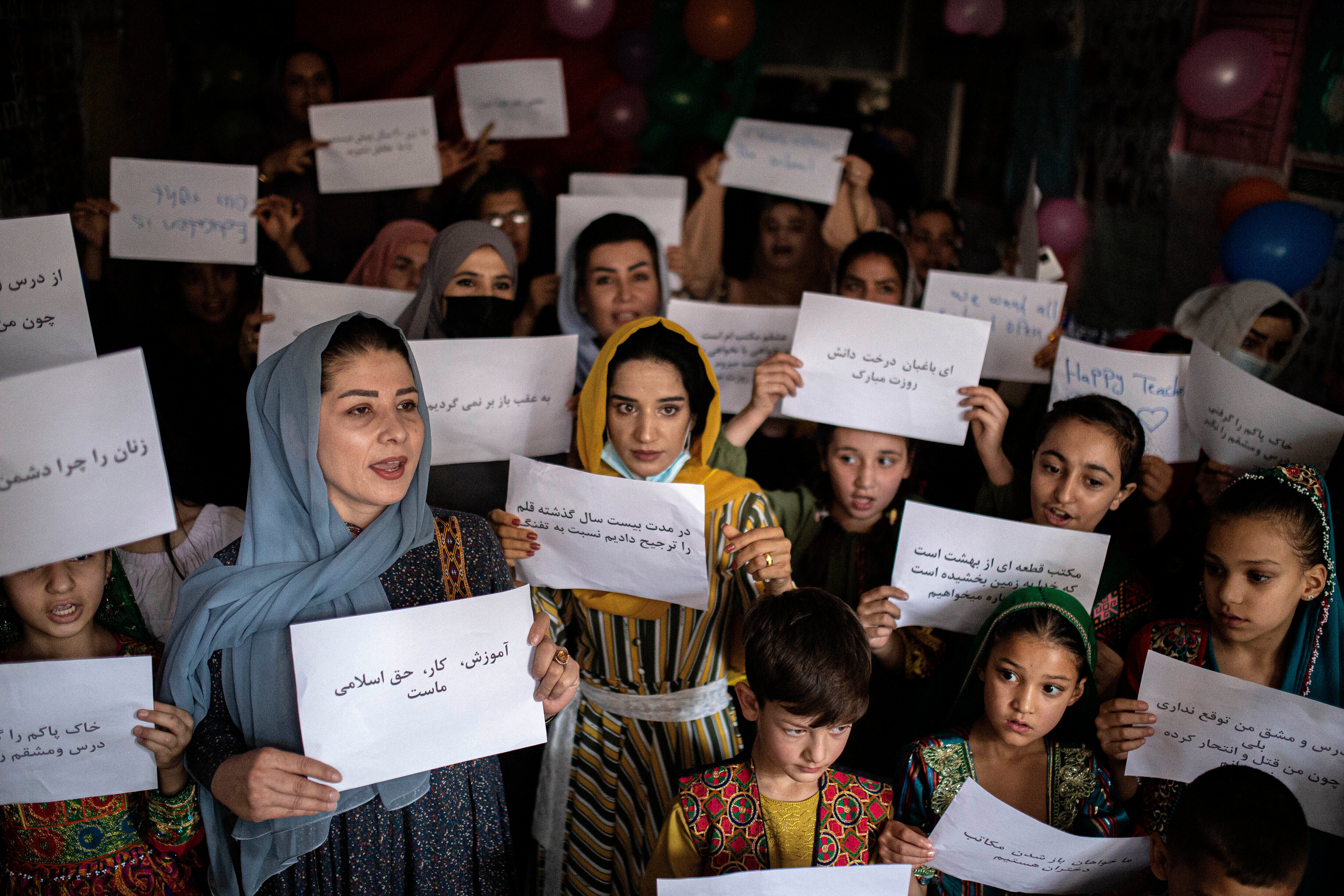Taliban storm Kabul apartment, arrest activist, her sisters
The Taliban have stormed an apartment in Kabul, arresting a woman rights activist and her three sisters

Your support helps us to tell the story
From reproductive rights to climate change to Big Tech, The Independent is on the ground when the story is developing. Whether it's investigating the financials of Elon Musk's pro-Trump PAC or producing our latest documentary, 'The A Word', which shines a light on the American women fighting for reproductive rights, we know how important it is to parse out the facts from the messaging.
At such a critical moment in US history, we need reporters on the ground. Your donation allows us to keep sending journalists to speak to both sides of the story.
The Independent is trusted by Americans across the entire political spectrum. And unlike many other quality news outlets, we choose not to lock Americans out of our reporting and analysis with paywalls. We believe quality journalism should be available to everyone, paid for by those who can afford it.
Your support makes all the difference.The Taliban stormed an apartment in Kabul smashing the door in and arresting a woman rights activist and her three sisters, an eyewitness said Thursday. A Taliban statement appeared to blame the incident on a recent women's protest, saying insulting Afghan values will no longer be tolerated.
The activist, Tamana Zaryabi Paryani, was among about 25 women who took part in an anti-Taliban protest on Sunday against the compulsory Islamic headscarf, or hijab, for women. A person from the neighborhood who witnessed the arrest said about 10 armed men, claiming to be from the Taliban intelligence department, carried out the raid on Wednesday night.
Shortly before she and her sisters were taken away, footage of Paryani was posted on social media, showing her frightened and breathless and screaming for help, saying the Taliban were banging on her door.
“Help please, the Taliban have come to our home . . . only my sisters are home,” she is heard saying in the footage. There are other female voices in the background, crying. “I can’t open the door. Please . . . help!”
Associated Press footage from the scene on Thursday showed the apartment's front door, made of metal and painted reddish brown, dented and left slightly ajar. The occupants of a neighboring apartment ran inside their home, not wanting to talk to reporters. An outer security door of steel slats was shut and padlocked, making it impossible to enter Paryani’s apartment.
The witness said the raid took place around 8 p.m. The armed men went up to the third floor of the Kabul apartment complex where Paryani lives and began pounding on the front door ordering her to open the door.
When she refused, they kicked the door repeatedly until it opened, the witness said. “They took four females away, all of them were sisters,” the witness said, adding that one of the four was Paryani, the activist.
The witness spoke on condition of anonymity, fearing Taliban reprisal.
The spokesman for the Taliban-appointed police in Kabul, Gen. Mobin Khan, tweeted that Paryani's social video post was a manufactured drama. A spokesman for the Taliban intelligence, Khalid Hamraz, would neither confirm nor deny the arrest.
However, he tweeted that “insulting the religious and national values of the Afghan people is not tolerated anymore” — a reference to Sunday's protest during which the protesters appeared to burn a white burqa, the all-encompassing traditional head-to-toe female garment that only leaves a mesh opening for the eyes.
Hamraz accused rights activists of maligning Afghanistan's new Taliban rulers and their security forces to gain asylum in the West.
Since sweeping to power in mid-August, the Taliban have imposed widespread restrictions, many of them directed at women. Women have been banned from many jobs, outside the health and education field, their access to education has been restricted beyond sixth grade and they have been ordered to wear the hijab. The Taliban have, however, stopped short of imposing the burqa, which was compulsory when they previously ruled Afghanistan in the 1990s.
At Sunday's demonstration in Kabul, women carried placards demanding equal rights and shouted: “Justice!” They burned a white burqa and said they cannot be forced to wear the hijab. Organizers of the demonstration said Paryani attended the protest, which was dispersed after the Taliban fired tear gas into the crowd of women.
Paryani belongs to a rights group known as “Seekers of Justice," which organized several demonstrations in Kabul, including Sunday's. The group's members have not spoken publicly of her arrest but have been sharing the video of Paryani.
The New York-based Human Rights Watch criticized the crackdown, saying that since taking over Afghanistan five months ago, the Taliban “have rolled back the rights of women and girls, including blocking access to education and employment for many."
“Women’s rights activists have staged a series of protests; the Taliban has responded by banning unauthorized protests,” the watchdog said in a statement after Sunday's protest.
The Taliban have increasingly targeted Afghanistan's beleaguered rights groups, as well as journalists, with local and international television crews covering demonstration often detained and sometimes beaten.
Also Thursday, the Committee to Protect Journalists issued a statement asking the Taliban to investigate a recent attack on a documentary film maker Zaki Qais who said two armed men, who identified themselves as Kabul police officials, entered his home and beat him. One tried to stab him, according to Steven Butler, the CPJ's Asia program coordinator.
"Afghanistan’s Taliban rulers must immediately launch an investigation to identify and bring to justice those who attacked journalist Zaki Qais,” said Butler. “The Taliban’s continued silence on these repeated attacks on journalists undermines any remaining credibility of pledges to allow independent media to continue operating.”
Last week the CPJ sought information on an attack on another Kabul-based journalist, Noor Mohammad Hashemi, deputy director for the non profit Salam Afghanistan Media Organization, who was beaten up by three unidentified men.